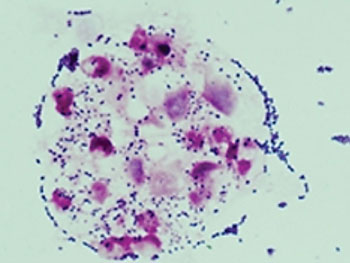Mutated Group B Streptococcus Causes Neonatal Sepsis
By LabMedica International staff writers
Posted on 02 Sep 2015
Streptococcus agalactiae or group B Streptococcus is a commensal of the human gut and genitourinary tract, and a leading cause of neonatal infections, in which vertical transmission from mother to child remains the most frequent route of contamination.Posted on 02 Sep 2015
The leading cause of early onset group B Streptococcus (GBS) infections in infants is thought to be aspiration of GBS-contaminated amniotic or vaginal fluid, leading to pneumonia or sepsis and in later onset cases, which develop after two to three weeks, may result in meningitis.

Image: Gram stain of Streptococcus agalactiae or group B streptococcus (Photo courtesy of Institut Pasteur).
Microbiologists at the Institut Pasteur (Paris, France) and their colleagues compared for the first time samples of GBS from pairs of infected newborns and their mothers. They performed whole-genome comparison of 47 GBS samples from 19 mother-child pairs uncovered 21 single nucleotide polymorphisms (SNPs) and seven insertions/deletions. Within the detected SNPs, 16 appear to have been fixed in the sampled population, whereas five mutations were found to be polymorphic. In the infant strains, 14 mutations were detected, including two independently fixed variants affecting the response regulator CovR (covRS) locus, known to encode a major regulatory system of virulence.
A one-nucleotide insertion was also identified in the promoter region of the highly immunogenic surface protein ribbon gene (Rib). Gene expression analysis after incubation in human blood showed that these mutations influenced the expression of virulence-associated genes. Additional identification of three mutated strains in the mothers' milk raised the possibility of the newborns also being a source of contamination to their mothers.
The scientists found that in five out of the 19 sampled newborns, mutations with a potential role in promoting virulence had occurred in GBS. Philippe Glaser, PhD, the group leader said, “In most cases, GBS is just naturally virulent in neonates. The genomic changes in GBS that were found only in a few cases were genetically identical in most of the mother-infant pairs analyzed.” The study was published on August 17, 2015, in the Journal of Bacteriology.
Related Links:
Institut Pasteur














